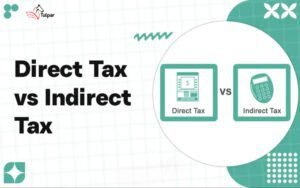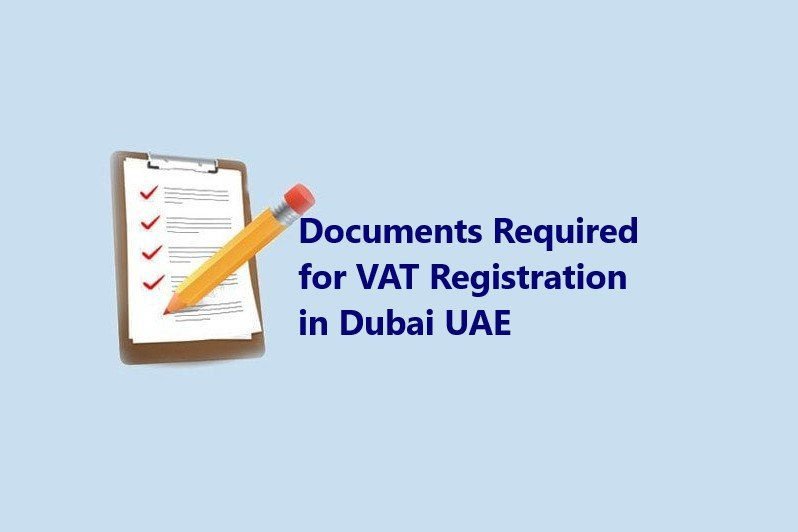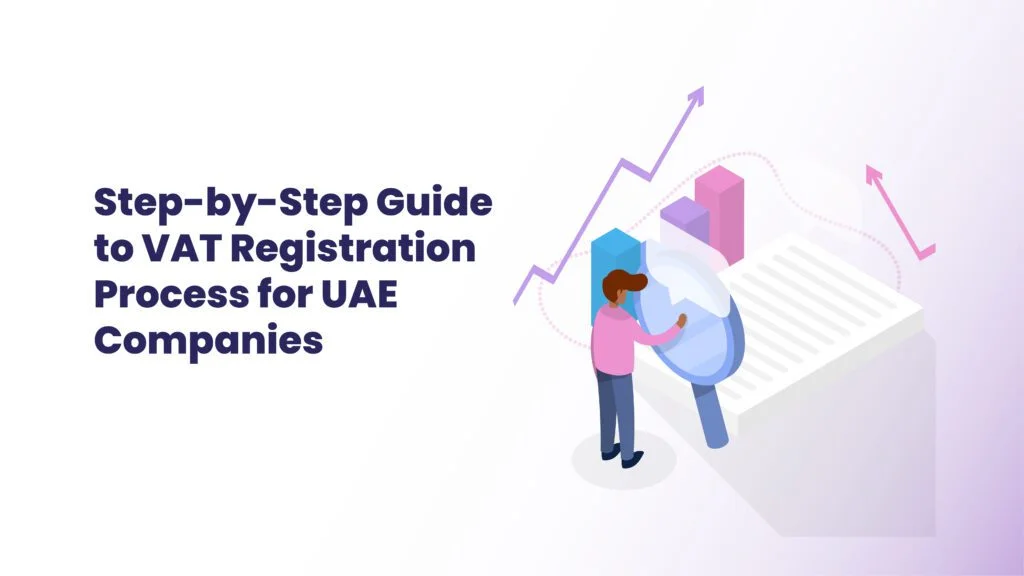
Table of Contents
Related Articles


Let's Talk
Sign Up For Free Consultation
How To Apply For VAT Registration in UAE
VAT (Value Added Tax) is an essential component of the tax system in the United Arab Emirates (UAE), impacting both local businesses and foreign investors alike. It applies to various goods and services, making it vital for businesses to understand how to navigate the VAT registration process effectively. Whether you are a newly established startup or an existing business, ensuring compliance with VAT regulations is crucial for smooth operations. The Federal Tax Authority (FTA) manages the registration, collection, and compliance processes, and businesses must keep up with the mandatory registration threshold and other relevant rules to avoid penalties.
This guide offers a step-by-step breakdown of how to apply for VAT registration in the UAE, covering the key aspects such as the requirements for both mandatory and voluntary VAT registration, the documents required for the application, and how to handle challenges during the registration process. By following these guidelines, businesses can ensure they meet their VAT obligations, maintain proper records of taxable supplies, and adhere to the country’s tax compliance standards, ultimately supporting their long-term financial stability and success in a competitive marketplace.


Understanding VAT in the UAE
Value Added Tax (VAT) is a consumption tax introduced in the UAE on January 1, 2018, and is applied to most goods and services. Managed by the Federal Tax Authority (FTA), VAT is set at a standard rate of 5% and covers all taxable supplies and imports. The introduction of VAT has impacted businesses across the country, both in terms of pricing and overall compliance with UAE tax laws, making it a key component of the tax system.
For businesses that meet the mandatory registration threshold, VAT registration is essential. These businesses must register for VAT and obtain a Tax Registration Number (TRN) from the FTA. The TRN allows companies to charge VAT on their sales and claim back input tax paid on their purchases. Compliance with VAT regulations is mandatory for maintaining smooth operations and avoiding penalties.
Understanding the VAT framework and its impact on business operations is crucial for companies in the UAE. VAT affects cash flow, pricing strategies, and compliance obligations. By ensuring proper VAT management, businesses can streamline their financial processes, meet regulatory standards, and avoid potential complications with the Federal Tax Authority.
Importance of VAT Registration for Businesses
Businesses in the UAE must understand that they must register for VAT if their taxable supplies exceed the mandatory registration threshold of AED 375,000 within a 12-month period. VAT registration is vital for several reasons:
- Legal Compliance: Failing to register for VAT can lead to significant penalties, making it imperative for businesses to comply with the VAT rules.
- Claim Input Tax: Once registered, businesses can reclaim VAT paid on their purchases, thereby improving cash flow.
- Increased Credibility: A VAT-registered business is viewed as more credible, enhancing its reputation with customers and suppliers.
- Access to VAT Returns: Registered businesses can file VAT returns in the UAE, allowing them to report and pay VAT to the FTA on time, avoiding fines and complications.
- Business Growth: Registration enables businesses to operate transparently and legally, paving the way for future growth and expansion in the UAE market.
Tulpar Global Taxation Accounting and Bookkeeping Services can provide expert guidance on the VAT registration process, ensuring that businesses comply with all legal requirements and efficiently manage their VAT obligations.
To determine whether a business is eligible to register for VAT in the UAE, it is essential to evaluate the following criteria:
- Mandatory Registration Threshold: If a business’s taxable supplies exceed AED 375,000, it is required to register under VAT.
- Voluntary Registration Threshold: Businesses whose taxable supplies are between AED 187,500 and AED 375,000 may choose to register for VAT voluntarily.
- Business Structure: Companies operating in a UAE free zone might have specific VAT considerations and exemptions, depending on their activities and structure.
- Supplies and Imports: Businesses that make taxable supplies or import goods subject to VAT must also consider their obligations to register for VAT.
Understanding these eligibility criteria helps businesses assess whether they must apply for VAT registration or seek exemption from VAT registration.
Gather Required Documents


When you decide to apply for VAT registration, the first step is to gather necessary documents, which include:
Applicant and Contact Information
- Business Name and Legal Status: Clearly indicate your business’s registered name and legal form (e.g., LLC, sole proprietorship).
- Contact Details: Provide accurate contact information, including phone numbers and email addresses.
- Tax Registration Number (TRN): If applicable, include any existing TRN related to previous registrations.
Banking Information
You must provide comprehensive banking information, which includes:
- Account Number: Your UAE bank account number is required to facilitate VAT-related transactions.
- Bank Statements: Recent bank statements that demonstrate business transactions help verify the financial status of the business.
Details of Business Relationships
Lastly, include relevant details of your business relationships:
- Taxable Supplies: Provide a comprehensive list of taxable supplies offered by your business.
- Business Relationships: Include information about suppliers and customers to clarify your trading activities.
- Association Registration Documents: If applicable, include any documents that prove associations with other registered businesses.
Completing the VAT Registration Process


Once you have gathered all documents required for VAT registration, you can proceed to complete the VAT registration. You can utilize the online VAT registration form available on the FTA’s website for a seamless experience. Make sure to provide accurate and complete information, as any discrepancies can lead to delays in the approval of your registration application.
After submitting your VAT registration application, the FTA will review your submission, and registration can be tracked through their online portal. Upon approval, you will receive your VAT registration certificate, enabling you to operate as a VAT-registered business in the UAE. Businesses that register for VAT in Dubai or any other emirate are expected to comply with VAT regulations and file VAT returns regularly. Failing to file VAT on time can lead to penalties, so it is crucial to maintain accurate records of taxable supplies and imports.
By following these guidelines and seeking assistance from Tulpar Global Taxation, businesses can effectively manage their VAT registration in Dubai and across the UAE. Our expertise ensures compliance with VAT laws and efficient filing of VAT returns, allowing you to focus on growing your business while we handle your VAT purposes. If you have questions about VAT registration or need assistance, contact Tulpar Global Taxation today for tailored services in accounting and bookkeeping.
Step-by-Step Guide to VAT Registration


Creating an E-Services Account
The first step in the VAT registration process is to create an e-services account on the Federal Tax Authority (FTA) website. This online portal is essential for managing your VAT-related activities, including submitting your VAT registration application and filing VAT returns.
To create your account:
- Visit the FTA e-services portal.
- Fill in the required contact details, including your business email and phone number.
- Provide your Trade License or Certificate of Registration details.
- Complete the mandatory fields and verify your identity through an Authorized Signatory.
Once registered, you’ll receive a confirmation email to activate your account. This account will allow you to access various VAT-related services, including the online VAT registration form.
Filling Out the VAT Registration Application
After creating your e-services account, log in to fill out the VAT registration application. Ensure that you have all relevant documents at hand, including:
- Business License: Proof of your business activities.
- Financial Documents: Recent financial statements, including audited or non-audited financial statements to reflect your annual turnover.
- Bank Details: Your bank account details, including the account number for VAT-related transactions.
- Proof of Business Address: Document verifying your business location.
When filling out the application:
- Provide accurate information about your core business activities and any taxable supplies you make.
- Indicate if your annual turnover exceeds the mandatory registration threshold of AED 375,000 or if you choose voluntary registration below this threshold.
- Include your anticipated turnover and a monthly turnover declaration to support your registration request.
Carefully review the application for completeness and accuracy before submission to avoid delays or refusal of VAT registration.
Submitting the Application
Once you’ve filled out the VAT registration form, submit it through your e-services account. The FTA will review your application and notify you of its status. The typical processing time can vary, so it’s essential to regularly check the progress of VAT registration on your online portal.
After approval, you will receive a VAT registration certificate, allowing you to legally charge VAT on your taxable supplies and file VAT returns. Ensure that you keep a copy of your VAT certificate for your records and compliance obligations.
Why Choose Tulpar Global Taxation For Auditing?


Tulpar Global Taxation stands out as the premier choice for VAT registration in the UAE. Renowned for their meticulous approach and deep expertise, they deliver customized solutions that ensure swift compliance with local laws. By choosing Tulpar, businesses gain not just compliance assurance, but a strategic partner dedicated to optimizing their tax obligations.
With a track record of excellence and client satisfaction, Tulpar Global Taxation is your gateway to seamless VAT registration in the dynamic UAE market. Trust Tulpar for expert guidance that empowers your business to thrive amidst regulatory complexities.
Common Challenges in VAT Registration
Despite the straightforward nature of the VAT registration process, businesses often encounter challenges, such as:
- Incomplete Documentation: Failing to provide all relevant documents can lead to delays in registration.
- Understanding VAT Regulations: Businesses may struggle with the complexity of VAT regulations and obligations.
- Errors in the Application: Mistakes in filling out the VAT registration application can result in rejection or delays.
- Compliance Requirements: Meeting ongoing VAT compliance requirements can be challenging for new businesses.
Consulting with professionals like Tulpar Global Taxation Accounting and Bookkeeping Services can help mitigate these challenges and ensure smooth registration.
Importance of Maintaining VAT Compliance
Maintaining VAT compliance is crucial for businesses in the UAE. This includes:
- Accurate VAT Returns: Ensuring that VAT returns are filed accurately and on time helps avoid penalties.
- Detailed Records: Keeping detailed records of all financial transactions, including taxable expenses, is essential for auditing purposes.
- Understanding VAT Liability: Being aware of your VAT liability and how it impacts your business finances is vital for long-term success.
Regular training and updates on VAT obligations can enhance your compliance efforts and protect your business from legal actions.
Consequences of Failing to Register for VAT
Not registering for VAT when required can lead to significant consequences, including:
- Fines and Penalties: The FTA imposes penalties for non-registration or late registration, which can escalate over time.
- Legal Actions: Businesses may face legal actions if they fail to comply with VAT laws.
- Loss of Reputation: Being non-compliant can damage a business’s reputation with clients and suppliers.
To avoid these pitfalls, it is crucial to assess your eligibility for VAT registration and take the necessary steps to comply with the VAT registration requirements.
Mandatory vs. Voluntary VAT Registration
In the UAE, businesses must understand the difference between mandatory and voluntary VAT registration:
Mandatory Registration: Businesses whose annual turnover exceeds the mandatory registration threshold of AED 375,000 must register for VAT. Failure to do so can result in penalties.
Voluntary Registration: Businesses with a turnover between AED 187,500 and AED 375,000 may opt for voluntary registration. This allows them to reclaim VAT on their taxable supplies but comes with the responsibility of filing regular VAT returns.
Choosing the right registration path depends on your business’s financial situation and long-term strategy.
Frequently Asked Questions (FAQs)
All UAE-resident businesses whose annual turnover exceeds AED 375,000 are required to register for VAT. Businesses below this threshold may opt for voluntary registration.
The standard VAT rate in the UAE is 5%, which applies to most goods and services. However, certain zero-rated supplies, such as basic food items and healthcare services, are not subject to VAT.
The VAT registration process typically takes around 5 to 10 business days, depending on the completeness of your application and supporting documents.
Yes, freelancers can register for VAT if their annual turnover exceeds the mandatory registration threshold or if they choose voluntary registration.
If your VAT registration application is rejected, review the feedback provided by the FTA, rectify any issues, and resubmit your application. Consulting with a professional like Tulpar Global Taxation can also help address specific concerns and improve your chances of approval.
Contact Us:
- Website: www.tulpartax.com
- Email: info@tulpartax.com
- Phone: +971-54 444 5124



